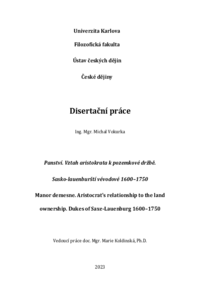Panství. Vztah aristokrata k pozemkové držbě. Sasko-lauenburští vévodové 1600-1750
Manor demesne. Aristocrat's relationship to the land ownership. Dukes of Saxe-Lauenburg 1600-1750
dizertační práce (OBHÁJENO)

Zobrazit/
Trvalý odkaz
http://hdl.handle.net/20.500.11956/181012Identifikátory
SIS: 205327
Kolekce
- Kvalifikační práce [25018]
Autor
Vedoucí práce
Oponent práce
Kubeš, Jiří
Šantrůčková, Markéta
Fakulta / součást
Filozofická fakulta
Obor
České dějiny
Katedra / ústav / klinika
Ústav českých dějin
Datum obhajoby
26. 5. 2023
Nakladatel
Univerzita Karlova, Filozofická fakultaJazyk
Čeština
Známka
Prospěl/a
Klíčová slova (česky)
historická krajina|panství|sasko-lauenburští vévodové|bádenská markrabata|baroko|aristokracie|raný novověkKlíčová slova (anglicky)
historical landscape|dominion|Dukes of Saxe-Lauenburg|Markgraves of Baden-Baden|baroque|aristocracy|early-modern periodPodle Manuela Schramma představuje 17. století přelom ve vnímání přírody a krajiny v západní a střední Evropě. Tato disertace se pokouší sledovat ony změny v přístupu aristokracie k jejich panství. Na vzorku českých panství vévodů sasko-lauenburských se práce zaměřuje na získávání statků a budování rezidencí, sakrálních (církevních) staveb, zahrad, vodohospodářské infrastruktury, lesů a hospodářských dvorů a jejich managementu. Na základě výzkumu je možné tvrdit, že panství mělo pro svého majitele (a jeho rodinu) tři základní funkce: hospodářskou, estetickou a rekreační (volnočasovou). Požadavky na plnění všech tří funkcí byly často naplňovány na stejném území. Úspěšné skloubení těchto funkcí vedlo k tomu, že majitel panství byl vnímán jako dobrý hospodář (Hausvater). V případě princezen Anny Marie Františky a Sibylly Augusty se tento obraz spojoval se stereotypem dobré vdovy. Disertační práce sleduje správu a proměny panství podle požadavků jejich majitelů a snaží se (re)konstruovat jejich vztah a postoj k panství.
According to Manuel Schramm, the 17th century marks a turning point in the perception of nature and landscape in Western and Central Europe. This thesis attempts to trace these changes in the attitude of aristocrats towards their dominions. Based on a sample of Bohemian demesnes of the Dukes of Saxe-Lauenburg, the thesis focuses on the acquisition of estates and the development of residences, sacral (church) buildings, gardens, water infrastructure, forests and farms and their management. The thesis argues that the dominion had three basic functions for its owner (and his family): economic, aesthetic and recreational (leisure). The requirements to fulfil all three functions were often met within same area of the estate. The successful combination of these functions led to the owner of the dominion being portrayed as a good Hausvater (householder). In case of the Princesses Anna Maria Francisca and Sibylla Augusta, this was combined with the stereotype of the good widow. The dissertation follows the management and changes of the dominion according to the demands of its owner and tries to (re)construct his/her the relationship and attitude towards the dominion.
